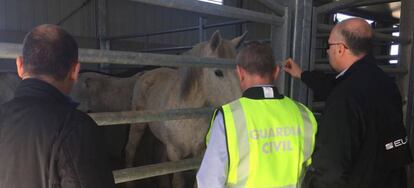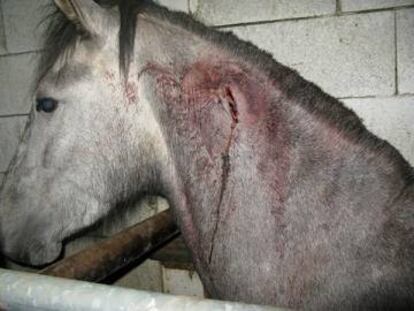Horse meat meant for a Spanish zoo was sold for human consumption
New revelations in an ongoing investigation into an international criminal ring show that some of the shipments tested positive for listeriosis

An ongoing investigation into an international ring that sold horse meat unfit for human consumption has turned up new evidence of crimes in Spain.
In April 2017, the Spanish Civil Guard arrested several members of a ring allegedly headed by a Dutch national named Johannes Fasen, who was living in Calpe, in Spain’s Mediterranean region, and was wanted by French and Belgian authorities.
The scheme leaders referred to these animals as “sleeping or lying horses”
Sources at Spain’s High Court, the Audiencia Nacional, have now said that this network allegedly also kept some of the horse meat meant to feed the felines at the zoo in Vigo, in northern Spain, and sold it as beef products for human consumption.
This meat was coming from the municipal slaughterhouse in Toreno (León). The horses used for meat were sometimes ill and did not undergo the necessary health controls required by law. The facility would occasionally open at night, outside regular hours, in order to put down these animals without the usual oversight.
Wiretaps carried out by the Civil Guard show that the scheme leaders referred to these animals as “sleeping or lying horses.” After being processed at a plant in Valmojado (Toledo), part of this illegal meat was then sold in other parts of Europe. Many of the animals originally came from northern Spain and Portugal.

The new revelations are part of an ongoing investigation named Operation Gazel, which has ramifications in at least five countries. There are around 65 suspects including breeders, meat industry entrepreneurs, veterinarians and slaughterhouse managers.
The probe shows that on February 4, 2017 a meat-processing business in Valmojado (Toledo) sent an establishment in Belgium a shipment of meat products that were contaminated with listeriosis. According to the investigation, Belgium’s Federal Safety Agency raised the alarm after an inspector found the dangerous bacteria in frozen meat that had been shipped 23 days earlier from Valmojado. This company had exported over 3,400 kilograms of contaminated meat.
In the case of the horse meat sold to the Vigo zoo, a vet there noticed that part of the shipments were missing – as much as 400 kilograms at a time. Despite asking the slaughterhouse about it, he received no reply. This meat was being allegedly held back by the criminal ring, who sold it for human consumption at a much higher price in other European countries.
The ring used cash to bypass Tax Agency controls, and switched each animal’s microchip, often using cruel methods, to make it look like the horses had undergone the necessary health checks before reaching the slaughterhouse. Around 18,000 horses may have gone through the ring’s hands, representing annual benefits of around €20 million, the investigation shows.
In Italy, Europol seized several shipments of horse meat for sale in two major supermarket chains. The meat had come from a slaughterhouse in Astorga (León) and contained prohibited substances such as phenylbutazone and ossiphenylbutazone.
English version by Susana Urra.
Tu suscripción se está usando en otro dispositivo
¿Quieres añadir otro usuario a tu suscripción?
Si continúas leyendo en este dispositivo, no se podrá leer en el otro.
FlechaTu suscripción se está usando en otro dispositivo y solo puedes acceder a EL PAÍS desde un dispositivo a la vez.
Si quieres compartir tu cuenta, cambia tu suscripción a la modalidad Premium, así podrás añadir otro usuario. Cada uno accederá con su propia cuenta de email, lo que os permitirá personalizar vuestra experiencia en EL PAÍS.
¿Tienes una suscripción de empresa? Accede aquí para contratar más cuentas.
En el caso de no saber quién está usando tu cuenta, te recomendamos cambiar tu contraseña aquí.
Si decides continuar compartiendo tu cuenta, este mensaje se mostrará en tu dispositivo y en el de la otra persona que está usando tu cuenta de forma indefinida, afectando a tu experiencia de lectura. Puedes consultar aquí los términos y condiciones de la suscripción digital.








































